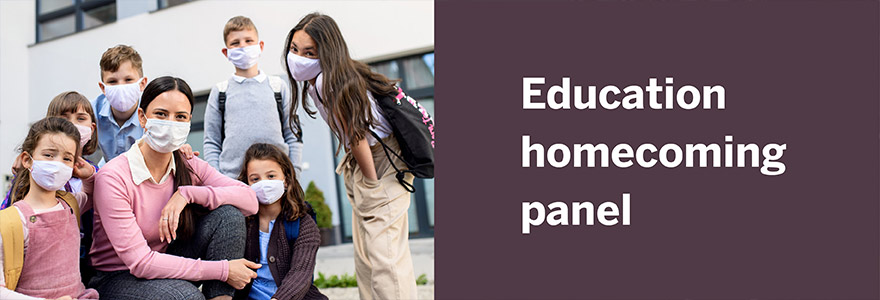
News and Events
Saturday, Sept. 25
10 – 11 a.m., ET
Zoom
Sign up
Alumni invited to sign up for Education homecoming panel

Four Western Education faculty members will share their research on how education can recover from the COVID-19 pandemic.
Professors Prachi Srivastava, Perry Klein, Katreena Scott and Claire Crooks will highlight their research and provide recommendations on how education can move forward during a Homecoming panel.
In particular, the panelists will focus on how equity can help every child, family and teacher recover in a post-pandemic world. Education dean Donna Kotsopoulos will moderate the panel, which will be held online via Zoom on Sept. 25.
“Children, families and communities have experienced significant challenges over the last year and a half,” Kotsopoulos said. “Our faculty will be contributing in important ways to overcome these challenges in the months and years ahead.”
Srivastava will discuss how the pandemic has affected equity in Ontario schools while Klein will focus on how young readers and writers can catch up on their literacy skills.
In addition, the panel will turn its attention to relationships. Scott will examine how society can respond to the ‘shadow pandemic’ of gender-based violence and child maltreatment and Crooks will look at promoting post-pandemic well-being and achievement using an evidence-based approach.
“Attendees will hear the many challenges that have happened to our children, families and communities over the past year and a half,” Kotsopoulos said. “They will also see what we’re doing as a Faculty to ensure how we can overcome these challenges in the months and years ahead.”
About the panelists
Professor Prachi Srivastava is a tenured Associate Professor at Western University, specializing in education and global development. She is also a Member of the World Bank Expert Advisory Council on Citizen Engagement. Previously, she served with the United Nations Mission in Kosovo and the International Rescue Committee. She holds a doctorate from the University of Oxford. Currently, Dr. Srivastava is working on the global education emergency caused by the COVID-19 pandemic. She has led high-level policy briefs on education policy and planning and equity implications of the pandemic for the Think 20 (T20), the official global engagement group of the G20, for the 2020 and 2021 G20 Summits. Domestically, Dr. Srivastava is part of the author team for the brief on education for the Ontario COVID-19 Science Table. She also led the creation of the COVID-19 School Dashboard, an open-access data visualization portal that maps school-level cases in Ontario with school-level demographic data to provide a clearer indication on the impact on local school communities. The dashboard has been widely covered in local and international media. Dr. Srivastava has been invited to provide expertise and commentary on COVID-19 education disruptions by the UNICEF Office of Global Insight and Policy, UNESCO, the BE2 education donor working group, and a range of global and Canadian civil society and non-governmental organizations. She has frequently appeared in The Globe and Mail, CBC, Global News TV, radio, and online media outlets, amongst a range of scholarly and other media, for this work and analysis. Dr. Srivastava's long-term research interests are: non-state private sector engagement in education; global philanthropy and impact investment; private schooling and education privatization; and global education policy and the right to education in the Global South.
Professor Klein began his career as a teacher in North York, Ontario after completing a PhD in Applied Educational Psychology at the Centre for Applied Cognitive Science at the University of Toronto. Prior to serving as Associate Dean (Research) in the Faculty of Education, Dr. Klein taught courses on educational psychology, and on teaching struggling readers and writers in the elementary grades. He leads a team investigating “Early Intervention in Writing.” This project, funded by a SSHRC Insight Grant, takes an evidence-based approach to four questions: How can we teach writing strategies and self-regulation to beginning writers? How can we make writing education more effective for struggling writers, including students with learning disabilities? How can writing instruction be organized to make it inclusive and effective? How should instruction in composition and mechanics be sequenced, balanced and integrated?
Professor Scott is a Psychologist and Professor and a CRC Tier I. She leads an applied research program aimed at ending violence in family relationships, with specific expertise on addressing violence perpetration in men. She is internationally known for her research on empirically and ethically sound policies and practices for intervening with men who have used violence against their partners and/or children. The Caring Dads program that she developed (http://www.caringdads.org) is currently running in many sites across Canada, as well as in the US, UK, Ireland, Wales, Germany, Australia and Sweden. She is currently leading work that brings together professionals from across Canada to identify and better recognize the expertise of specialists who provide services to address intimate partner violence. She is a contributor to international networks including the DV@Work Network and the Safer Families Centre of Excellence.
Professor Crooks is a Professor at the Faculty of Education at Western University and the Director of the Centre for School Mental Health. Dr. Crooks is one of the lead developers and researchers of the Fourth R, the relationship-based program aimed at preventing violence and related risk behaviors among adolescents. She is particularly interested in adaptation and implementation issues related to evidence-based practices. Her work in this area includes collaborating with partners to develop and evaluate strategies that meet the unique needs of Indigenous youth and other priority groups. Dr. Crooks provides continuing education to judges, lawyers, and other court professionals as a Faculty member for the U.S. National Council of Juvenile and Family Court Judges. She is co-author of more than 100 articles, chapters, and books on topics, including school mental health, children’s exposure to domestic violence, child custody and access, adolescent dating violence and risk behavior, and trauma. Dr. Crooks is a clinical psychologist, and is registered in the areas of clinical, school, and forensic psychology.

